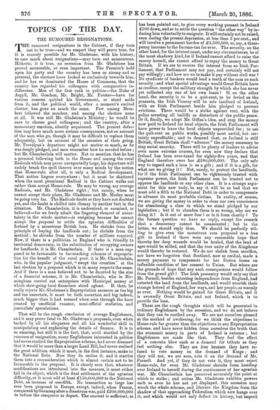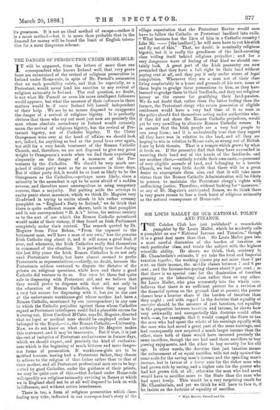TOPICS OF THE DAY.
THE RUMOURED RESIGNATIONS.
THE rumoured resignations in the Cabinet, if they turn out to be true—and we suspect they will prove true, for it is scarcely possible for Mr. Gladstone, with his history, to care much about resignations—may turn out momentous. Hitherto, it is true, no secession from Mr. Gladstone has proved memorable, or even important. The Premier's hold upon his party and the country has been so strong and so personal, the electors have looked so exclusively towards him, and he has so dominated the House of Commons, that the country has regarded his colleagues with comparative in- difference. Men of the first rank in politics—the Duke of Argyll, Mr. Goschen, Mr. Bright, Mr. Forster—have for various reasons quitted his Government, or stood aside from it, and the political world, after a moment's excited chatter, has gone on much the same. Few among Mem- bers followed the seceders, and among the electors none at all. It was still Mr. Gladstone's Ministry ; he would be sure to choose good colleagues ; and the country, after a momentary emotion, silently acquiesced. The present defec- tion may have much more serious consequences, not on account of the men who go, though it may be difficult to replace them adequately, but on account of the occasion of their going. Mr. Trevelyan's departure might not matter so much, as he was deeply pledged, and men remember how he seceded before ; but Mr. Chamberlain will matter. Not to mention that he has a personal following both in the House and among the rural Radicals which may prove unexpectedly large, his departure will rudely break the spell thrown over many minds by the notion that Home-rule, after all, is only a Radical development. That notion lingers everywhere ; but it must be shattered when the most prominent Radical in the Cabinet walks out rather than accept Home-rule. He may be wrong, say average Radicals, and Mr. Gladstone right ; but surely, when he cannot accept their plans, Mr. Gladstone and Mr. Morley must be going very far. The Radicals doubt as they have not doubted yet, and the doubt is chilled into dismay by another fact in the situation. Mr. Chamberlain, it is understood, or surmised, or believed—for we freely admit the lingering element of uncer- tainty in the whole matter—is resigning because he cannot accept the proposal to settle the agrarian difficulties of Ireland by a monstrous British loan. He shrinks from the principle of buying the landlords out ; he shrinks from the method ; he shrinks from the number of millions required. Now, if there is a politician in England who is friendly to territorial democracy, to the substitution of occupying owners for landlords, it is Mr. Chamberlain. If there is a man sup- posed to be favourable to far-reaching schemes of expropria- tion for the benefit of the rural poor, it is Mr. Chamberlain, who, in the popular judgment, " swept the counties " at the last election by a proposal which is in many respects the same. And if there is a man believed not to be daunted by the size of a financial scheme, it is Mr. Chamberlain, who in Bir- mingham carried out enterprises with Municipal money at which slow-going local financiers stood aghast. If, then, he really rejects Mr. Gladstone's Expropriation measure as too big and too uncertain, it must be both uncertain and big indeed, much bigger than it had seemed when seen through the haze created by unofficial rumour, semi-official statistics, and journalists' speculations.
That will be the rough conclusion of average Englishmen, and it may prove fatal to Mr. Gladstone's proposals, even when backed by all his eloquence and all his wonderful skill in manipulating and explaining the details of finance. It is to us amazing, but still it is the fact, that, until startled by the rumours of resignation, many Englishmen interested in politics had never studied the Expropriation scheme, had never dreamed that it would be more than a larger Land Bill, had never realised the great addition which it must, in the first instance, make to the National Debt. Now they do realise it, and it startles them into a reconsideration which is almost certain not to be favourable to the proposal. It is clearly seen that, whatever modifications are introduced into the measure, it must either fail in its object, which is the final settlement of the agrarian difficulty, or it must add at least £150,000,000 to the National Debt, an increase of one-fifth. No transaction so large has ever been proposed in Europe, except, indeed, when France, conquered by Germany after a disastrous war, paid £200,000,000 to induce the conqueror to depart. The amount is sufficient, as has been pointed out, to give every working peasant in Ireland £300 down, and so to settle the question "the other way" by in- ducing him voluntarily to emigrate. It will certainly not be raised, even during the present depression, at less than 3 per cent., and will involve a permanent burden of £4,500,000, or, say, a three- penny increase to the Income-tax for ever. The security, on the other hand, for the interest must, under any circumstances, be of the most shadowy kind, for if Ireland cannot afford to raise the money herself, she cannot afford to repay the money to Great Britain. If we are to receive the interest from an Irish Par- liament, that Parliament may not pay, and certainly will not pay willingly ; and how are we to make it pay without civil war ? No syndicate of bankers would lend a tenth of the sum on such security ; and what special advantage would Great Britain have as creditor, except the military strength by which she has never yet collected any one of her own loans ? If, on the other hand, the security is to be a quit-rent, to be levied on the peasants, the Irish Viceroy will be sole landlord of Ireland, with an Irish Parliament beside him pledged to prevent evictions. There would be a strike against rent, with the police arresting all bailiffs as disturbers of the public peace. Or if, finally, we adopt Mr. Giffen's idea, and stop the money now paid to Ireland for local objects, the Irish Parliament will have power to leave the local objects unprovided for ; to use the quit-rent on public works, possibly most useful, but cer- tainly unprofitable ; and to demand that, as Ireland is still British, Great Britain shall " advance " the money necessary to stop social anarchy. There will be plenty of leaders to advise even more extreme courses, for even now they declare that Ireland has been over-taxed for eighty-five years, and that England therefore owes her £280,000,000. The only safe way to regard such a loan is as a gift ; and if it is a gift, for what are we giving it ? Not, surely, to protect the landlords, for if the Irish Parliament can be righteously trusted with supreme power, the Irish Parliament can be trusted not to oppress the landlords or any other class. It is a strange argu- ment for this new body, to say it will be so bad that we must add a fifth to the National Debt in order to compensate in advance its most probable victims. In reality, of course, we are giving the money in order to clear our own consciences for abandoning a class to which we stand pledged by our legislation ; but if to abandon them is so wrong, why are we doing it ? Is it out of mere fear ? or is it from charity To the former question we have no reply, except the remark that a democracy cannot be assassinated ; but to the latter, we should reply thus. We should be perfectly wil- ling to give even the monstrous sum proposed as a free gift to Ireland if there were any reasonable hope that thereby her deep wounds would be healed, that the feud of ages would be stilled, and that the true unity of the Kingdoms would thereby be restored. We do not shrink from sacrifice, nor have we forgotten that Scotland, now so cordial, made a money payment to compensate for her Darien losses an inflexible condition of her consent to Union. Bat where are the grounds of hope that any such consequences would follow from the grand gift ? The Irish peasantry would only say that Mr. Parnell, besides extorting independence from England, had extorted the land from the landlords, and would nourish their strange hatred of England, her ways, and her people, as warmly as ever. Nothing would be gained for Great Britain, and it is avowedly Great Britain, and not Ireland, which is to provide the loan.
These are the rough thoughts which will be generated in ordinary Englishmen by the secession, and we do not believe that they can be soothed away. We are not ourselves pleased at the method of awakening, for we think the objections to Home-rule far greater than the objections to any Expropriation scheme, and have never hidden from ourselves the truth that the economic misery in parts of Ireland is extreme ; but Englishmen are made like that. They feel the effect of a concrete blow such as a demand for tribute as they feel nothing else. They are free because they have re- fused to vote money on the demand of Kings ; and they will not, we are sure, vote it on the demand of Mr. Parnell. And yet, if they do not vote it, they must reject Home-rule, for even Mr. Gladstone shrinks from handing over Ireland to herself during the continuance of her agrarian war. Mr. Chamberlain has perceived accurately the point at which to strike ; and unless Mr. Gladstone exhibits powers such as even he has not yet displayed, this secession may wreck the whole scheme, and liberate the Kingdom from the shadow of that approaching Federalism which now hangs over it, and which would not only deflect its history, but imperil
its greatness. It is not an ideal method of escape—rather it is a mean method—but it is more than probable that in the demand for money will be found the limit of English tolera- tion for a most dangerous scheme.



































 Previous page
Previous page